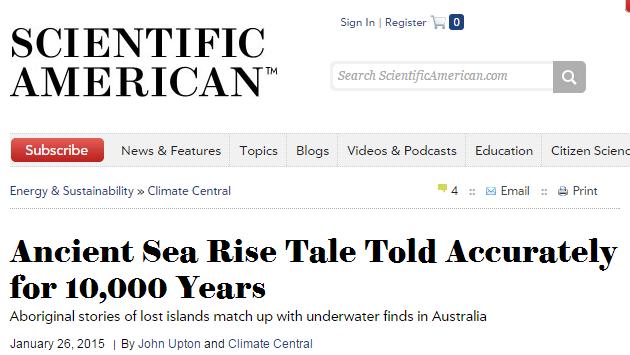Long Long Long Durée Oral Transmission February 4, 2015
Author: Beach Combing | in : Prehistoric , trackback***Thanks to Mike Dash and Penne for sending reports in***
This site has pioneered an oral transmission tag and particularly claims that human beings can transmit information over tens, even hundreds of generations without any recourse to writing: these range from hints of memories from the early Neolithic at Newgrange to impossibly old memories of inundation in Tasmania. Such claims for marathon oral memory banks have been, for the most part, scattered until now and ignored. However, there seems to be proof of a growing academic interest in the question in a recent spate of news articles connected to Nicholas Reid at the University of New England in Australia and Patrick Nunn a geographer from University of the Sunshine Coast also in Australia (what a country!). Reid is a linguist and Nunn a geographer and together they have combed through Aboriginal stories, recorded by the first European settlers, looking for connections between stories and landscape, particularly aspects of landscape that have since been hidden by time, but where Aboriginal stories perhaps recall an earlier epoch. They have come up with eighteen stories involving sea rises, where stories might recall lands now lost in the sea. Here is one example from the most detailed online report.
The Ngarrindjeri people tell stories of Ngurunderi, an ancestral character steeped in mythology. In one of their stories, Ngurunderi chased his wives until they sought refuge by fleeing to Kangaroo Island—which they could do mostly by foot. Ngurunderi angrily rose the seas, turning the women into rocks that now jut out of the water between the island and the mainland. Assuming this dark tale is based on true geographical changes, it originated at a time when seas were about 100 feet lower than they are today, which would date the story at 9,800 to 10,650 years ago.
In another online article Reid claims that ‘There are also stories about mega fauna and about comets’, but here the details are a lot scantier.
So will this idea stand up in the end?
Beach finds the idea of oral transmission over hundreds of generations soothing and exciting. However, he began life, curses, as a medievalist and saw how ‘facts’ rapidly get twisted out of recognition ‘in the mouths of the people’. The Romantic in him, then, is battling a nasty man with a hatchet called Experience. For these stories to work we need: (i) a watertight tale where knowledge could not be deduced (e.g. a crater shaped lake could, a geologically native might have worked out, once have been a volcano) and where it is unlikely that locals would have guessed something (e.g. universal stories about the sea being smaller a long, long time ago); (ii) proof or at least the real possibility of the continuity of a given human population in one locale over a long period; and (iii) reliable transmission onto the printed page, e.g. trustworthy witnesses with notepads who had no reason for inserting their own narratives when the local population came to tell them their truths.
Any other views of the credibility of oral transmission over the very long durée: drbeachcombing AT yahoo DOT com
Good that these issues are going to start being tested in peer-reviewed journals.
15 Feb 2014: Leif writes in ‘May I propose a fourth condition to your confirmations of oral transmission over hundreds of generations: (iv) The kind of event appears very rarely other indigenous legends unless it has a basis in fact. What if other relatively isolated native peoples have legends of vanishing lands, volcanic eruptions, suddenly appearing lakes, etc. when they could not possibly have witnessed the event? It would not make a strong argument for a real event behind the Ngurunderi legend. Even so, Australia seems a locale conducive to oral transmission.
Immigration was nonexistent, and climate and natural resources such that the way of life didn’t change over many centuries. If an event could be remembered for 10,000 years, one would find it in legends from the dreamtime.
Thanks Leif. I was stumbling towards this condition on 1. Here it is though spelt out.
19 Sep 2015: Penne writes in ‘Here’s a couple of new stories about oral transmission (1) and (2). The evidence for oral transmission of the 1700 Pacific Seaboard earthquake seems reasonable. There aren’t enough direct quotes of the Australian material to know what was being conveyed, maybe the source material is available online elsewhere (or will become available).’ thanks!



